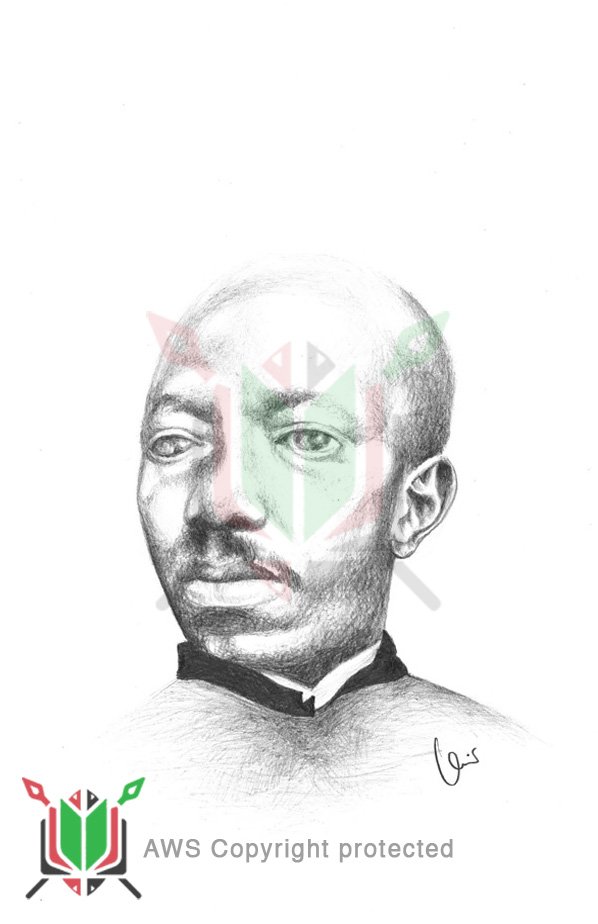
Martin Robison Delany (1812 – 1885)
Abolitionist, Physician, Editor, Journalist, Writer, Soldier, Black Nationalist
Birth
On May 6, 1812 in Charles Town, West Virginia, Martin Delany, the first “Black Nationalist,” was born to Pati and Samuel Delany, a “free person of color”. Delany would have been a slave but for the law that existed in the state of Virginia at the time of his birth. His father was a slave but his mother was a free woman and the law favored children born at that time be given their maternal status. Both Delany’s paternal and maternal grandparents were native Africans. It was rumored through the slave “grapevine” that his paternal grandfather was a chieftain in Liberia (formerly Gola), he was captured during an internal power struggle, sold into slavery and brought to America. The story continued to enfold that he later ran away to Canada, seeking his freedom and died from the treatment meted out to him when he resisted being brought back into slavery. His Maternal grandparents were said to belong to the Mandinka tribe who were located in the Niger valley, West Africa. Pati’s father was supposed to be a prince named Shango who was captured with his bride and brought as slaves to America. Virginia was one of the more “sympathetic” states towards the plight of the Africans who were torn from their homeland and forced into free labor, otherwise known as slavery. They were both given their freedom by their benevolent master and Shango returned to Africa while his lover Graci, stayed behind with their daughter, Pati.
This story is unsubstantiated but makes for a good love story, also, seeing that her daughter was born in America, Graci may not have been allowed to take her and did not want to leave her alone. Either way, Martin Delany was born a free man although attempts were made to enslave both him and his sister when they were a few years old. The fierceness of the Mandinka tribe is legendary and Pati, a descendant was no walkover. She hoisted her two children on her back and hips respectively and walked over 20 miles to the courthouse to argue her case. Based on the Virginia Constitution, she was born free and remained a free woman, therefore, any children born to her are supposed to be free also. She won her case and the family remained free. His father worked, purchased his freedom and joined them at a later date.
Education
Delany and his siblings learned to read from the New York Primer and Spelling Book which they received as a gift from a hawker (peddler} as they were known then. In Virginia, blacks were precluded from learning to read, therefore, when the book was discovered in 1822, his mother fled with her children to Chambersburg and Pittsburgh, Pennsylvania where Delany grew up. Delany continued his education, though somewhat haphazardly as he sometimes had to stop from school in order to assist with “bread-winning.” At age 19 years Martin Delany moved to Pittsburgh, Philadelphia to study theology but later diverted to medicine and received practical training as a doctors’ assistant. He eventually opened his own practice, specializing in ‘cupping and leeching’, then the two most widely used treatment for most diseases, while developing and involving in a more serious attitude towards the theoretical aspect of medicine. Between 1853-1854, there was an outbreak of cholera and many citizens, inclusive of physicians, fearing contamination, fled the city. Delany remained and treated many patients although he, like those who fled, had no knowledge of how the disease was transmitted. Delany lived in Pittsburgh for 25 years during which he joined literary circles whenever he was allowed, took part in anti-slavery demonstrations and or movements and became an advocate for equal rights for African-Americans in Northern states. However, based on his personal experiences, he doubted whether the United States would ever give equal status to black Americans. In Pittsburgh, Delany had attended the African Methodist Episcopal Church (A.M.E.) which had classes for adults who wished to further their education. Located on Wylie Avenue and founded a few years earlier, it was part of the first independent black branch of Methodist churches in the United States. After attending evening classes for awhile, he enrolled in Jefferson College where he studied ancient Greek and Roman history, philosophy, language, literature and archaeology; then referred to as the classics, he also studied Latin and Greek as a language separately.
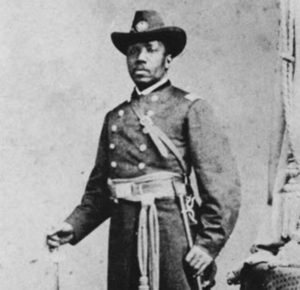
After years of study and knowing he was prepared for more formal training, Delany applied to, and was one of the first three black students enrolled at, Harvard Medical School in 1850. However, this period of his education was cut short as, due to protest by white students in his faculty, (who felt that it was degrading to fraternize with blacks particularly at such a high level of education) all three were dismissed after only one term. Blacks at that time had to demonstrate an exceptional intelligence quotient in order to be accepted at such institutions. It would have been devastating to the whites to have blacks succeeding or performing at a higher level than they were. This would have shown that black people, although discriminated against, could and would perform at the same or higher level than whites. This could not be allowed to be proven, hence the demonstrations. Convinced that the white ruling class would never allow blacks, regardless of how qualified they were, to hold any position of significance in the society, Delany was angry and his sentiments regarding racism was more expressive in his speeches as he lashed out against these injustices. He returned to Pittsburgh where he became active after the Fugitive Slave Act.
Achievements
Previous to enrolling at Harvard, Delany had tried publishing his own newspaper; The Mystery. Many of the articles he wrote were copied, reprinted in other black publications and widely distributed. Unfortunately,this was a very brief venture due to a “controversial” eulogy for the Reverend Fayette Davis that he had printed in 1846. He was sued by Fiddler Johnson, a black man and convicted of libel as Delany had named him in the article as being a “slave catcher.” Delany was fined $650 (an enormous amount of money at that time), which he could not afford to pay. Fortunately for him, he had white friends in the newspaper industry and they combined to pay the fine. He discontinued publication of The Mystery, became more actively involved in black political affairs and began attending the National Negro Convention which was held annually in Philadelphia since the early 1830s. He was inspired to set up a “Black Israel” on the east coast of Africa and he would be the Black moses to lead his people out of “Babylon” to freedom. His motto then was “Africa for the Africans!.”
The North Star was formed after a disagreement between Frederick Douglass and William Lloyd Garrison who both owned and operated another newspaper, The Liberator. Both Douglass and Garrison were on a speaking tour in 1848 when they were introduced to Martin Delany, which turned out to be an opportune moment for the two Ds, Delany and Douglas. This resulted in the birth of the North Star which Douglas fronted/ financed, with Douglas being the editor, printer and publisher. This gave him the opportunity to travel throughout the Midwest to promote the newspaper and to lecture and report on racial situations. Delany travelled all over the United States seeking sponsorship, lecturing and reporting via editorials on activities pertaining to African-Americans. Resulting from one of his reports in the North Star, in which a John McLean, a U.S. District Court Justice had had instructed the jury to consider it a punishable offence for any citizen to prevent anyone from trying to recapture a runaway slave, Simon P Chase, the abolitionist was motivated to successfully lead a protest to remove McLean as a candidate of the presidency of the Free Soil Party.
In 1852, still smarting from his unfair expulsion from Harvard and having some time at his disposal while on a business trip in New York City, Martin Delany wrote what started out as an article but turned out to be a book. The Condition, Elevation, emigration and Destiny of the Colored People of the United States, Politically Considered. The length of the title in itself shows that Delany did not set out to write a book. He wanted everyone to have an idea of the contents of the article in order to generate interest and increase circulation. In his book, he intimated that blacks would be happier if they emigrated and form a New Nation elsewhere, where they would be able to govern themselves. He suggested that the West Indies (Caribbean) or South America would be more conducive to their well-being. The more moderate abolitionists felt marginalized, also peeved that he pointed out their biases. In that, although they were “sympathetic” to African- Americans, yet they did not employ them in their businesses. Delany accused the abolitionists of practicing racial segregation, even though the Freemasons, a male fraternity, was said to be men of goodwill, good reputation, good moral standards. They devoted their time to friendship and fellowship and practice the “spirit of the universal brotherhood of man.” Having formed the hypothesis that African-Americans were; “a Nation within a Nation,” Martin Delany set about to stimulate the emigration of Africans from the United States declaring; “ we must go from our oppressors.” He coordinated a “National Emigration Convention,” which met at intervals throughout the 1850’s and surveyed potential locations in Central America and Africa. He explored his emigration theories in his writings: The Condition, Elevation, Emigration and Destiny of the Colored People of the United States Politically Considered and The Origin and Objects of Freemasonry; Its Introduction into the United States and Legitimacy Among Colored Men
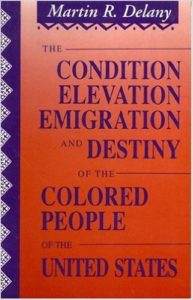
After the passage of the Fugitives Slave Act, 1850, Delany although a free man, was among one of the over 5,000 black immigrants who fled across the border to Canada. However, he stayed in contact with the anti-slavery movement in the United States and assisted with the recruitment of the Canadian black population by John Brown, the legendary abolitionist, to join and train in an army for a proposed invasion of the South in order to forcefully liberate African slaves. On his return from a trip to Nigeria in the mid 1850s where he had gone to negotiate the gift of land for African Americans, he promoted emigration in two of his publications: Blake; or the Huts of America, and Official Report of the Niger Valley Exploring Party (1861).
Martin Delany was the first man of color to hold an officer position in the United States army, a major during the Civil War. This makes it even more significant as African -Americans were regarded by most as mere property or lesser than the white man’s animals then as stated in his book: Blake; or the Huts of America; ( a novel about a slave rebellion) “Situated as we are, as mere nonentities in the midst of others, the most deserving, respectable and praiseworthy among us, in the eye of the law and its consequent enactments, being placed far beneath the most vile vagabonds while being denied the privileges granted to the pauper and vagrant; those, by the laws, declared to be nuisance; while privileges are being enjoyed by other men, privileges which from their nature necessarily elevate the female, the wife, mother, sister and daughter, and stimulate the tender youth; we colored male citizens are made the degraded vassals of the most insufferable servility, more tolerable than death itself.” Returning from one of his many trips, Delany came home to the Civil War in 1863 and, anticipating that a win for the Union (as opposed to the Confederates) would improve the status of “black” Americans, he set aside his emigration plans, persuaded President Lincoln to appoint him major of an all African-American infantry unit. Delany thought that once the Africans proved themselves as soldiers; honorable, brave men, they would be given their freedom and he went about recruiting more than 1,000 black men. These men were later recognized as being the catalyst for the Union army winning the civil war. They are immortalized and referred to in a song by the popular Jamaican singer, songwriter Robert Nesta Marley (Bob Marley), as “Buffalo Soldiers.”
Delany went to South Carolina to assist with the reconstruction of the state after the war and went to work in the Freedmen Bureau. Initially, he was a supporter of the Republican party and, although a man of color, he was very popular. In fact, He was so popular among the population that he ran for and narrowly lost the position of Lieutenant Governor in 1874. Delany switched his allegiance to the Democrats two years later when he realized that Republicans were losing control of the state. Democrats won and realizing his influence among the voters, the newly elected governor Wade Hampton, rewarded him with the prestigious position of a judge in the township of Charleston during which he conducted himself equitably and won the admiration of both blacks and whites.
Martin Delany had not totally abandoned the emigration of African -Americans and in 1878 he joined others in sponsoring the Liberian Exodus Joint Stock Steamship Company which made one poorly organized trip to Liberia. The ship was understaffed, under-stocked and under-financed. Few of the Africans returned to the US on another ship but most of those who remained in Liberia became first class entrepreneurs with successful careers to include the builder of the first steamship built in Liberia. In 1879 after hearing the report concerning the somewhat poorly organized trip to Liberia, he wrote “The Principia of Ethnology”, in which he reasoned for pride and purity of the races and for the self-regeneration of Africa. Realizing that his political career was coming to an end, Delany returned to his medical career and later moved to Boston where he became a businessman.
Publications
Let Nobody Turn Us Around Voices on Resistance, Reform and Renewal in African American Anthology- Martin Delany, 1852
Blake: or; The Huts of America- Martin R Delany, 18–?
Official Report of the Niger Valley Exploring Party- Martin R Delany, 1861
Search for a Place: Black Separatism and Africa,1860- Martin R Delany
The Condition, Elevation, Emigration and Destiny of the Colored People of the United States and Official Report of the Niger Valley Exploring Party- Martin R Delany
Origin of Races and Color: With an Archaeological Compendium of Ethiopian and Egyptian Civilization- Martin R Delany (This is one of the first books on black Egyptology, Anthropology and Archaeology,)
Martin Delany- Martin R Delany
Without Regard to Race- Martin R Delany
Martin Delany Quotes
“If we treated everyone we meet with the same affection we bestow upon our favorite cat, they, too, would purr.”-Martin R Delany
Every people should be originators of their own destiny.- Martin R Delany
“I am not in favor of caste, nor a separation of the brotherhood of mankind, and would as willingly live among white men as black, if I had an equal possession and enjoyment of privileges.”- Martin R Delany
Death
Delany had 11 children with his wife, 7 of whom survived to adulthood. Martin Robison Delany, one of the smartest African-American abolitionist of the 1800’s, died on January 24, 1885 in the state of Ohio at the age of 72.
We hope that you found the information above interesting and informative. All of the content used on our website is original and created especially for the educational uplifment of our visitors. This includes our images such as the sketch you see above created exclusively for our website. Please visit our online store to purchase items commemorating the great honorable Martin Delany and other African Warrior Scholars. Thank you for visiting!
Abibifahodie,
The AWS Team
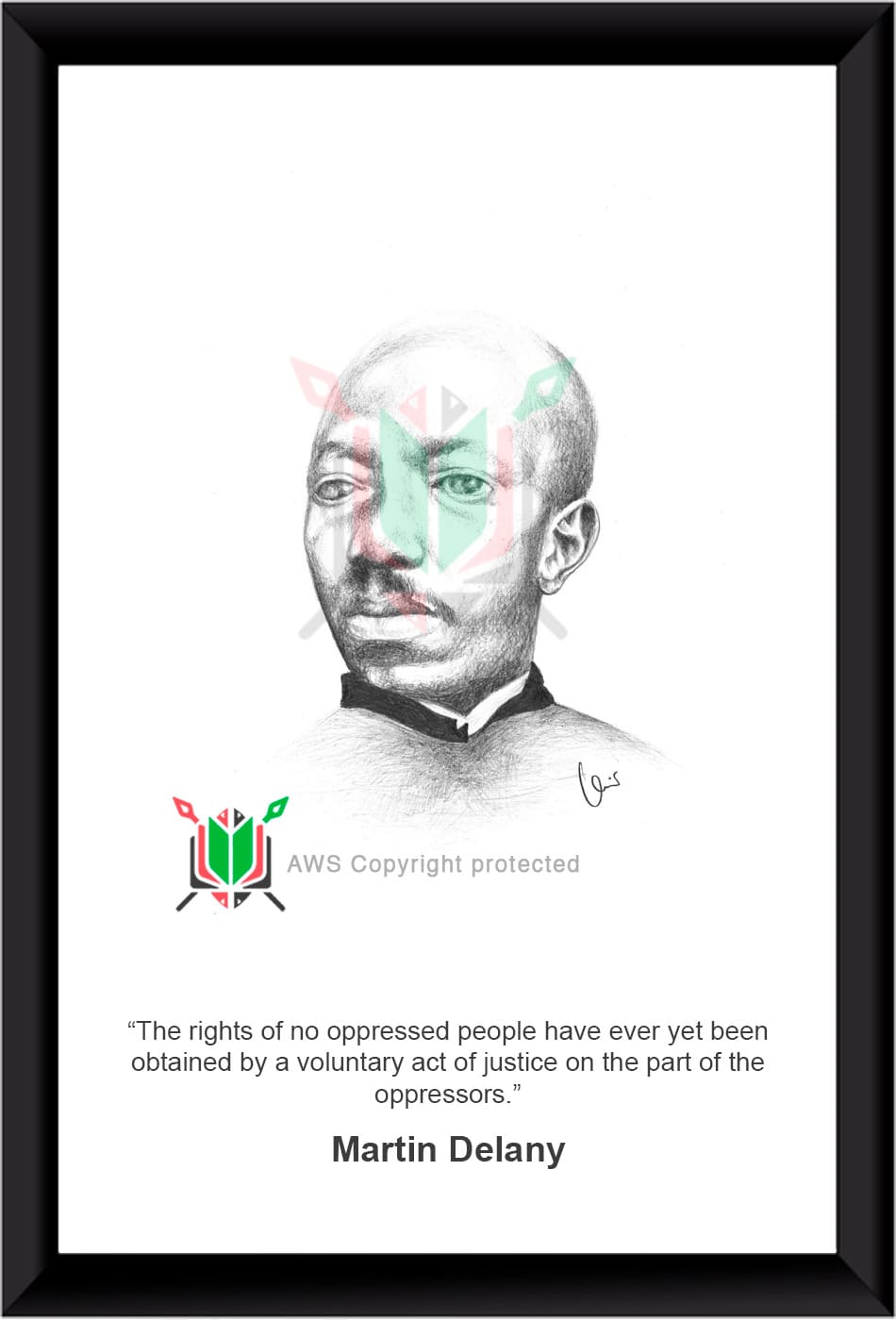
Martin Delany Custom Quote Sketches
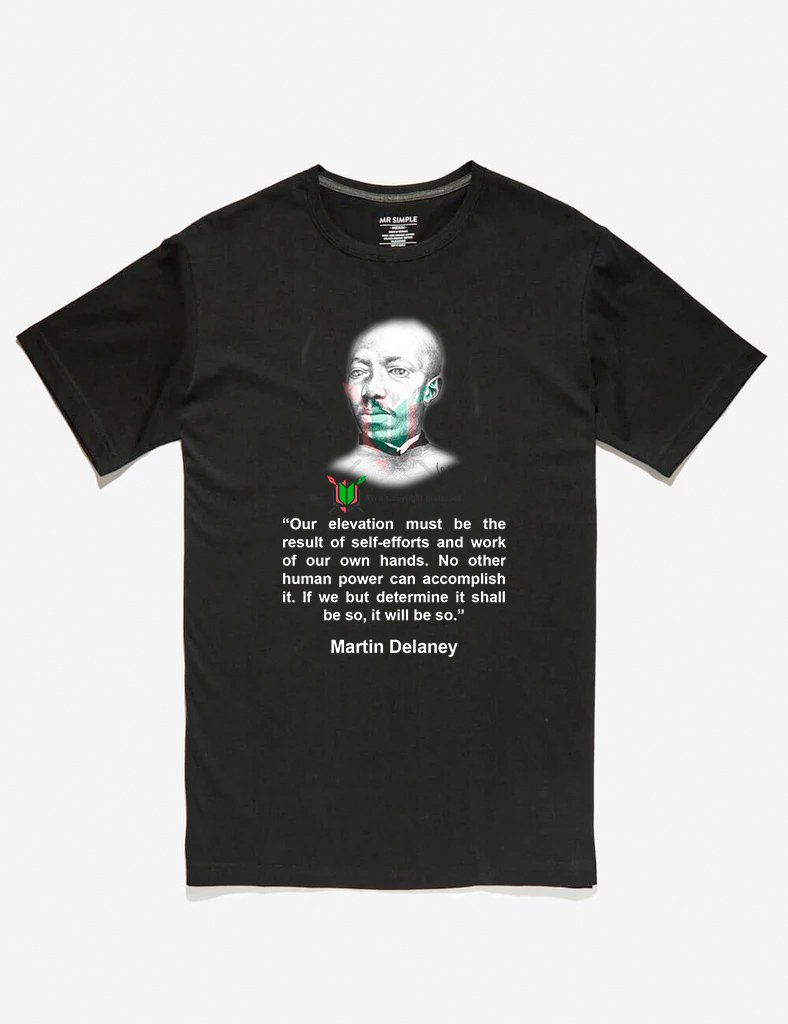
Martin Delany Custom Quote T-Shirts

